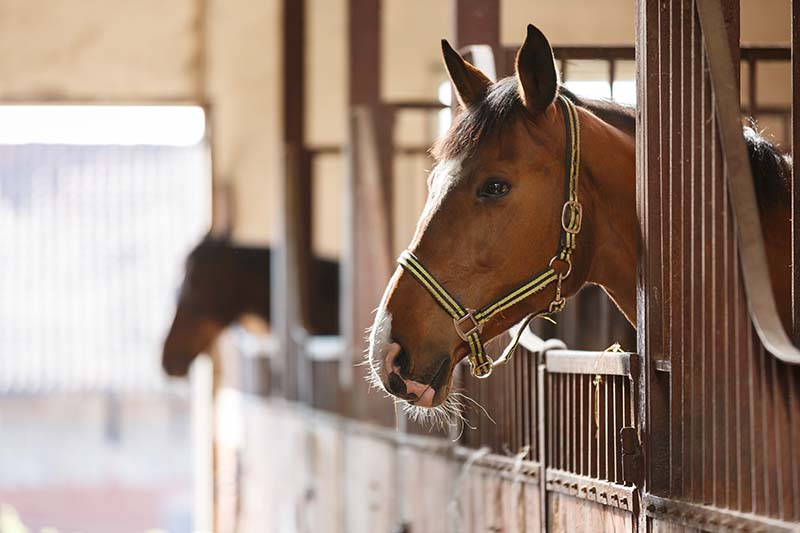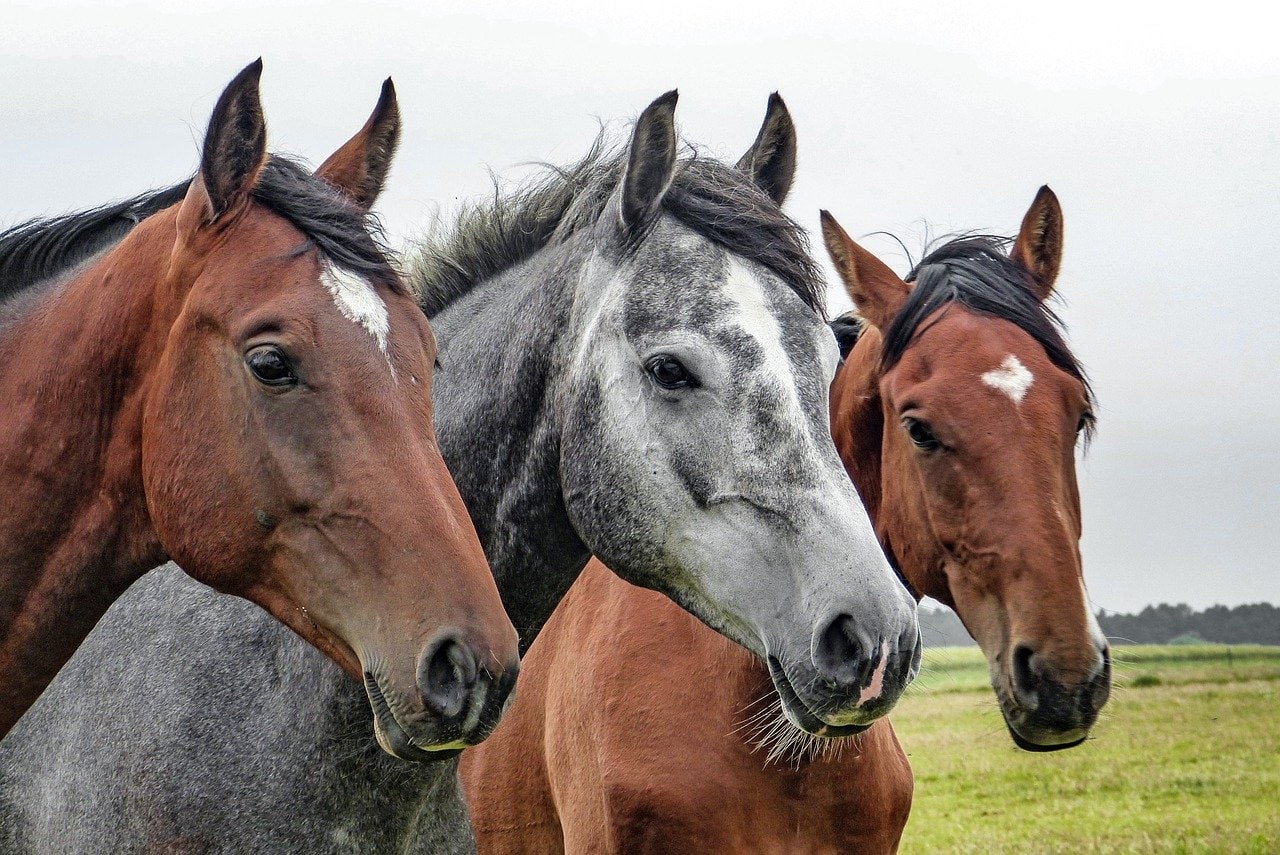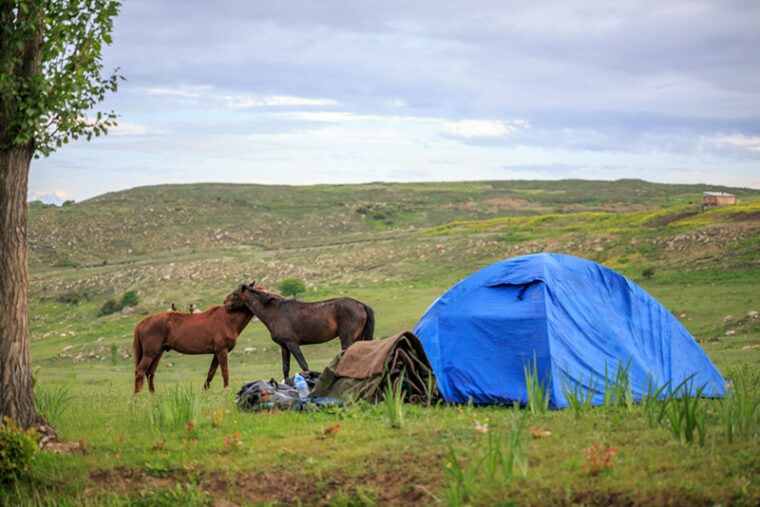
The United States is absolutely filled with equine-friendly campgrounds if you know where to look. Camping with a horse can be a ton of fun, with days spent outside riding on unfamiliar trails and nights spent together under the stars. It is a dream for many people. However, that dream can quickly become a nightmare if you are not properly prepared. The key to a successful camping trip with a horse is packing everything you will need and making a plan for containment and water.
This checklist will help guide you through everything you need to get started on a camping trip with your horse, including basic packing lists, tips for having a great trip, and the information and documentation you will want to have on hand before setting out.
The 8 Tips for Horse Camping
1. Scope Out the Campsite and Do Your Research
If you plan on camping with your horse, you do not want to pick a campsite willy-nilly. You should do a lot of research about the place you are bringing your horse to before you set out. You want to look up a series of things before you go. You will want to know how crowded it is, what the local wildlife is like, what the weather will be like, how large the campsites are, and what the local plants are like. You want to keep an eye out for potentially severe weather, toxic plants, and local wildlife that might spook your horse. A camping trip can quickly turn sour if you have to end up trying to prevent your horse from eating dangerous plants or soothing them because there are bobcats lurking about.
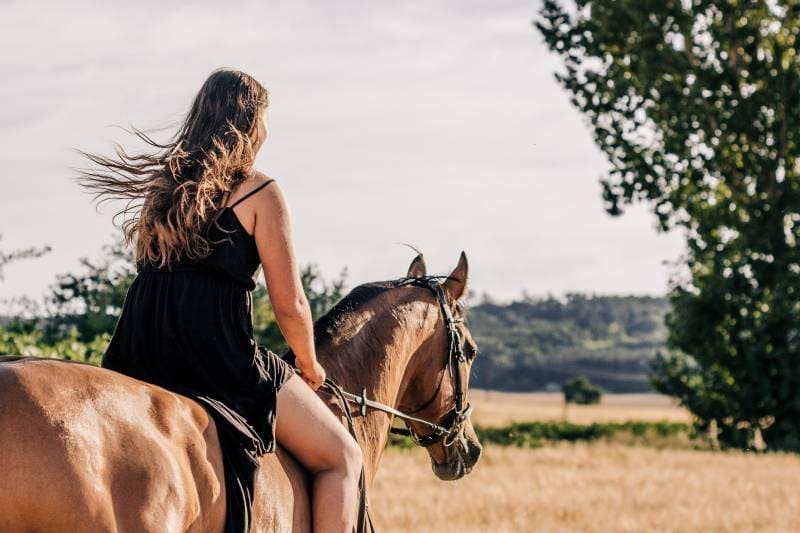
2. Know Your Horse and Tailor Your Trip to Them
All horses are a little different, and they will handle camping very differently. Some horses are very relaxed and unflappable and will do fine in many situations, while others are more easily stressed out and might struggle in a new environment. Take note of your horse’s particular behaviors and try to tailor the trip to make them as comfortable as possible. If they don’t like trailering, maybe pick somewhere close to home. If they are easily spooked by animals, try to pick a place with little wildlife. If they don’t like to be tied, bring along some corral panels or electric braid fencing to keep them contained without the need for a rope. If you tailor your trip to help match your horse’s personality, the experience will be much better than if you do not consider your horse at all.
3. Try to Have Easy Access to Fresh Water
If possible, try to pick a campsite that has freshwater available on site. It is risky to try to haul all the water you need out to your campsite. Water is heavy, it can spill, and horses have a habit of knocking over their buckets. If you run low on water, it can be very dangerous for your horse. When planning your trip, you want to make a note of where the nearest source of freshwater is and make a plan for keeping your horse well hydrated. Ideally, you will have a spigot on your particular site. Many equine campsites provide easy access to water, but not all of them do.

4. You Can Never Bring Too Much Rope
Pack rope. Then, pack more rope. After that, pack some more rope. Rope is critically important when you are out and about with your horse. The last thing you want to happen is to have your horse pull back and break a tie, only for you to realize that was the last one. If you run out of rope when camping, you will not be able to tie your horse or lead your horse properly. That can quickly turn into a disaster. Pack as much rope as you need, then add more. You can never have too much rope when you are away from the barn.
5. Make a Plan for Containing Your Horse
Containing your horse when you are sleeping is one of the most important things to consider before camping. Some horses will sleep nicely on a tie, but other horses will not. You can bring panels to block your horse at night. One great tip is that if you use the trailer as one of the walls of your makeshift stall, you only need to haul three panels out to the site instead of four. Some people string up electro braids to keep their horses in the campsite. Other people prefer to use hobbles. Whatever your method, be sure that you have a plan to keep your horse contained and have a plan in case they break out of containment.
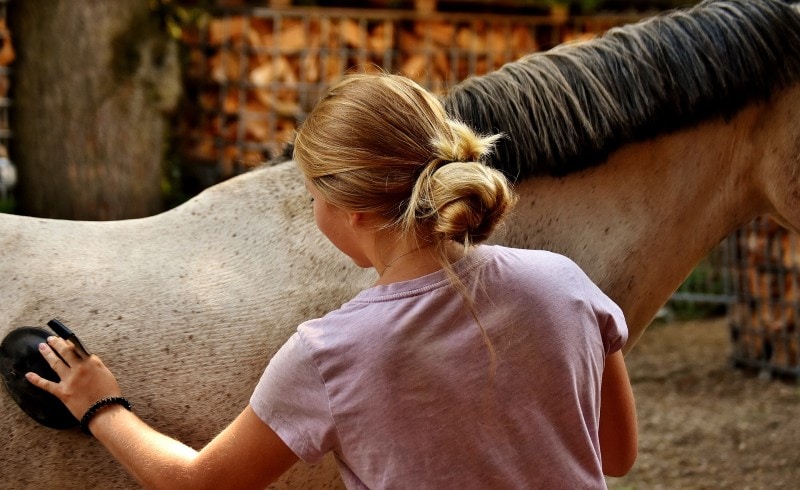
6. Triple Check Your Packing List
Make your packing list and then check it. Pack everything up and then check it again. Before you head out, give your things one last look over. You do not want to forget anything with a horse. It can be hard to run out to the local convenience store and find something for your horse if you forget it. Be sure to be diligent in your packing and make sure that your list is complete and that you have everything you might need while you are camping.
If you do happen to forget something, it is a good idea to know where the closest feed store or tack store might be. If there are no nearby stores to where you are going, you should be extra careful to try not to forget anything.
This may sound like a simple tip, but you would be surprised how many people breeze through their packing list without checking for errors and regret it later.
7. Don’t Forget Proper Documentation
You should always bring proper documentation when traveling with your horse. You want to bring proof of ownership and your vaccine records. Some campsites require that your horses are properly vaccinated before you bring them. If you are planning on crossing state lines with your horse, you might need to carry an interstate health certificate as required by the state you are entering and returning to. Not having these documents can lead to delays and headaches. It is always a good idea to carry these things when you are on the road with your horse to avoid any confusion or questions about your horse’s status.
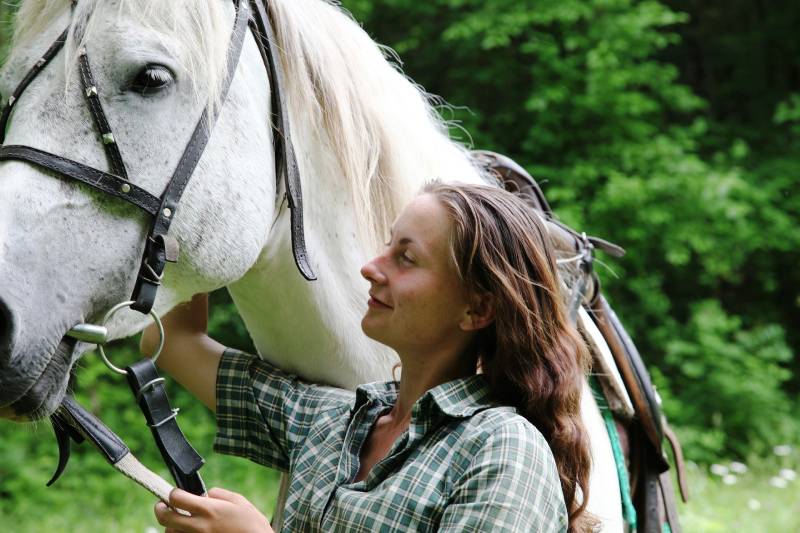
8. Overpack Food to Account for Waste or Accidents
Horses require a lot of food and water on a regular basis. Be sure to pack enough food for them. Try to pack a few extra days’ worth of food just in case. You can try to supplement your food stock with some high calorie grain to break into in an emergency. Bring enough hay to last the whole trip and the trailer ride to and from the campsite. You can also check to see if the place you are going has areas to let your horse graze. Being able to graze your horse on good grass can help reduce the need for food that you brought which gives you more leeway for your supplies. You don’t want to find yourself in a situation where your horse spills some grain, or you accidentally get your hay wet and are unable to feed your horse as a result.
Human Packing List
It can be easy to neglect your own packing list when traveling with a horse. People get so focused on providing for their horses that they sometimes forget to bring everything they need. If you do not have everything you need for a successful camping trip, you will not be at your best to also take care of your horse. Make sure that you bring all the supplies you need to make it through the camping trip comfortably, as well as your horse.
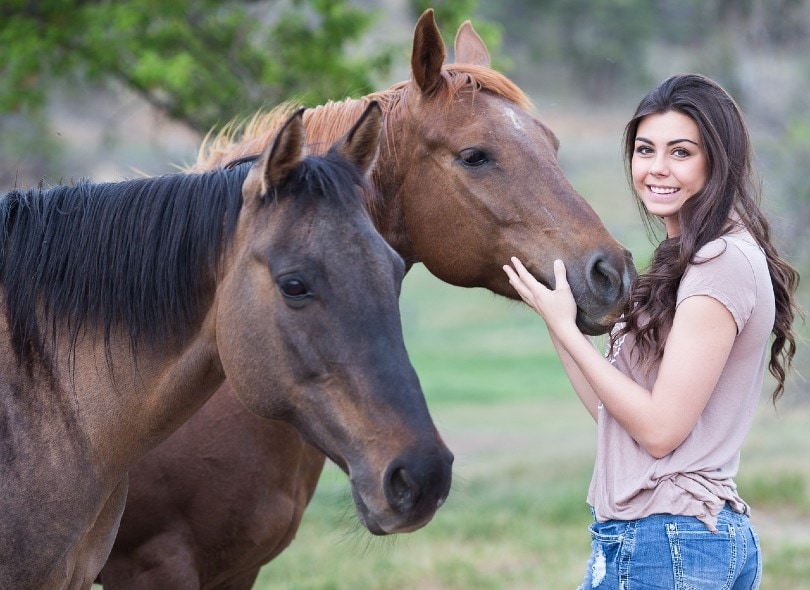
Human supplies:
Horse Packing List
It can be more difficult to replace broken or forgotten items for a horse when you are on the road than it is for people. That means you should make sure that you have absolutely everything you might need for your horse before leaving. Consider how long you are staying, how much riding you are going to be doing, and the environment that you are going to be in before you start packing.
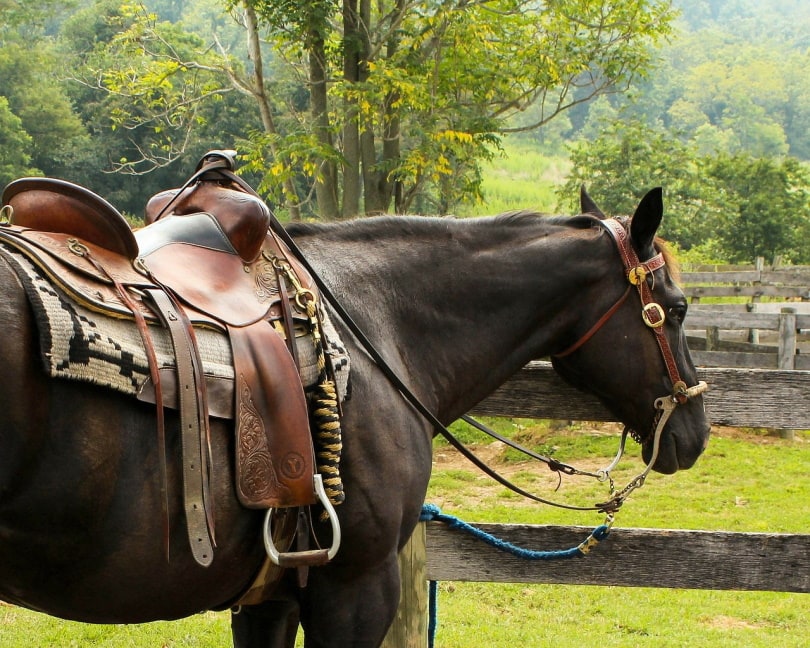
Horse supplies:
 What Is “Weed-Free” Hay and Why Should You Use It?
What Is “Weed-Free” Hay and Why Should You Use It?
When camping, experts suggest that you bring your horse weed-free hay to eat. Weed-free hay is hay that is certified to not have any invasive plants in it that could spread to your area. Weed-free hay is designed for people who travel with their horses. In many rural areas, hay and straw come from local sources, and the plants remain in the local ecosystem. If you bring local hay to a distant environment, you could accidentally spread grass and weeds that normally don’t grow there. That could cause a breakout of invasive plant species, harming the local ecosystem.
Weed-free hay works to prevent that by culling out anything that might be able to spread to a new area. You should use it to prevent yourself from accidentally changing the environment of your campsite. It is a part of the philosophy that you should leave no trace after you are done camping.
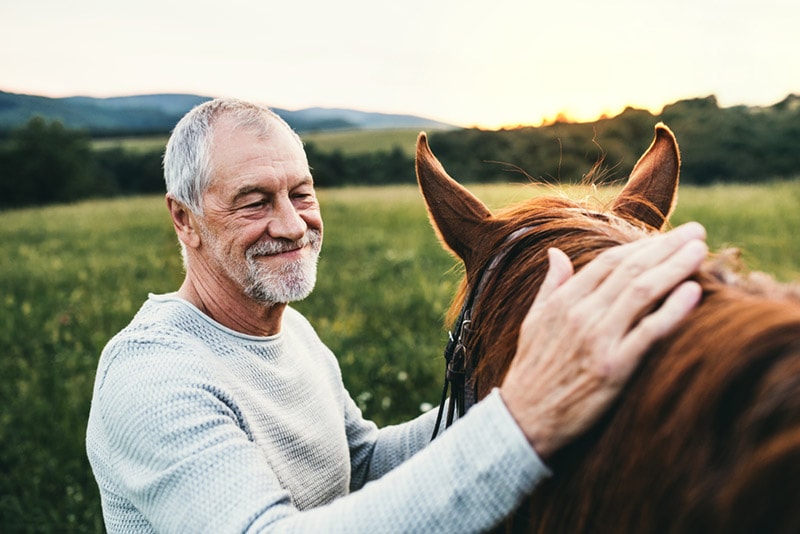
Try to Leave No Trace
It is harder to leave no trace with a horse than it is by yourself, but you should still try. Leave no trace is the idea that after you pack up and leave your campsite, the next group should have no visible signs that you had recently camped there. That means hauling out your trash, burying your fires, and not leaving any food out for animals to find. This can be difficult with a horse.
Horses will inevitably leave hay waste and manure behind. You can prevent this from causing long term issues by making sure you are using weed-free hay and that your horses are healthy and vaccinated before you travel. You do not want your horse to leave behind droppings that could have worms or parasites in them for other animals to get into. Try to rake your manure and hay into a pile and cover it with leaves and dirt so that it is out of sight and will start to decompose.
 Final Thoughts
Final Thoughts
Camping with a horse can be an amazing experience that forms lifelong memories. But it can also be stressful and difficult. Make sure you are prepared before you set out with your horse. Bringing a horse along for a wilderness trip is great, but having a horse around can also quickly make small problems into big problems. Make sure you have everything you need, and make sure you have a plan and do your research before you set out so that you have the best trip possible.
Featured Image Credit: zahariz khuzaimah, Shutterstock




